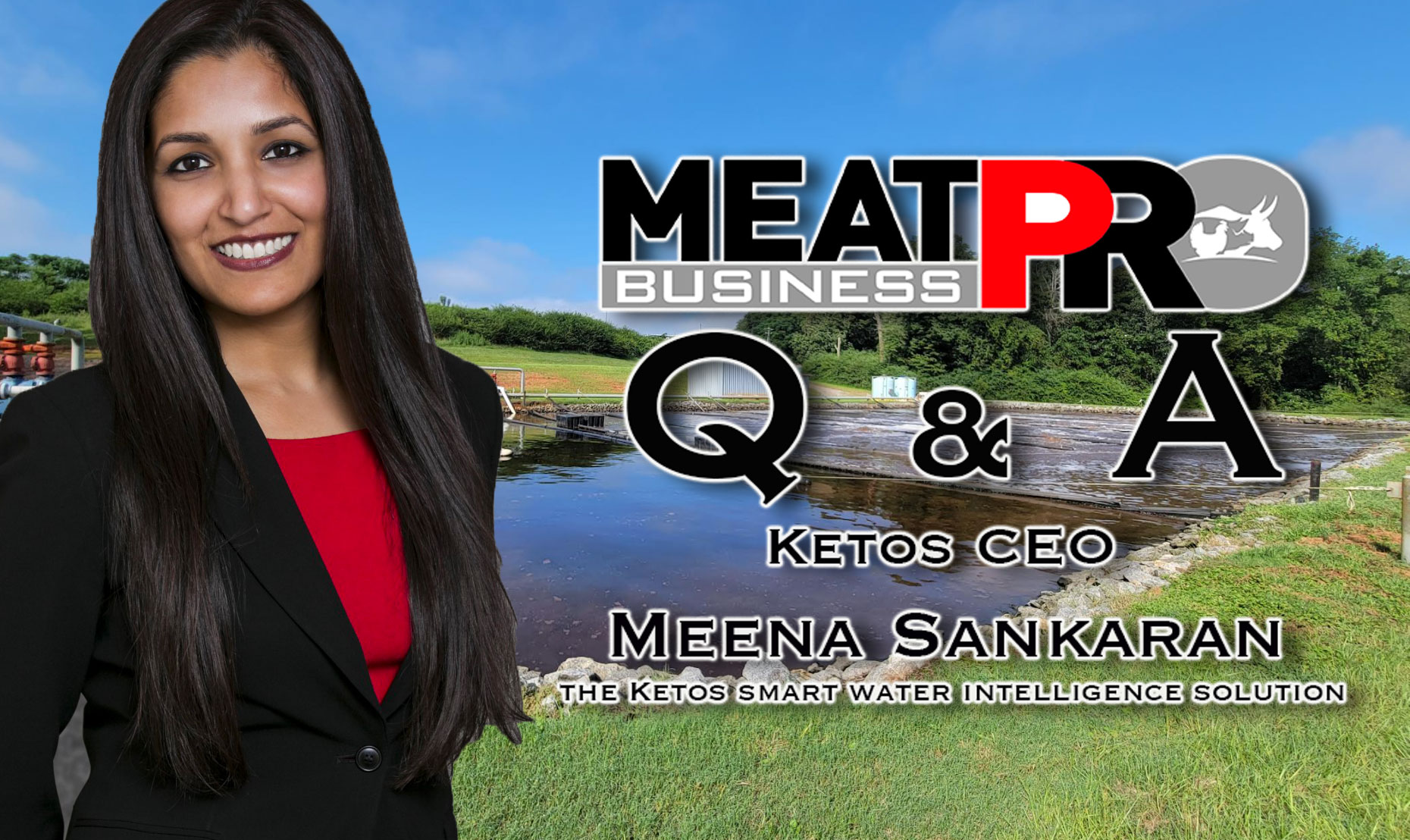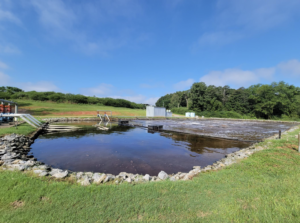Q&A: Meena Sankaran and the Ketos Solution

With increased droughts decimating herds and ravaging what previously had been fertile crop lands, water sustainability and resiliency has never been more important. For Ketos CEO, Meena Sankaran, clean water has been a lifelong mission
Growing up in India where millions suffer from waterborne diseases, global health and wellness has become her life’s mission. She rolled that philosophy into her company with great success since she founded it in 2015.
Seeking a better solution to water quality and monitoring by utilizing an innovative, intelligent platform model, driven by an intuitive, bi-directional communication software, and packaged in a revolutionary and cost-effective design, she has reset the bar for predictive water quality intelligence on the global playing field.
Meat Business Pro had a chance to talk with Meena about how the Ketos smart water intelligence solution is gaining momentum in the livestock and meat processing industries.
“It is so much more than just water quality data, because the water quality insight is just the beginning of all the other intelligence that can help farmers and processors in their core business“
MBP: How does KETOS patented water monitoring solution fit into the food production and processing industries specifically?
MS: When you look at instrumentation monitoring, you have a very select set of parameters that the industry has typically been able to monitor like chlorine, nitrates, nutrients, organics, and environmental parameters like pH or temperature. For this wide spectrum analysis, you would typically have to have a lot of handheld probes and online analyzers because each one would have to be dialed to a specific parameter and you would end up with a very big system. Then for everything else you need to measure where instruments don’t exist or the technology has not evolved to be able to measure, you typically would just send samples to the lab and wait for results.
What we wanted to address as a breakthrough with Ketos is: first, how can testing not be cost prohibitive because you are having to buy instrumentation for the different parameters that you want to understand about your water composition which most famers don’t have budgets for.
Second, you must have a person assigned, so extensive labor hours to clean and calibrate the system will add additional costs. Third, you’re also spending extensively on consumables. This is all very counterintuitive to high frequency testing, and as a result you’re not leveraging data to your advantage in order to better inform your operational decision making. We wanted to break that mold.
MBP: How did you accomplish that through your systems?
MS: The first thing we’ve done is decoupled how we manufactured our system itself. What I mean is, our system is completely autonomous, essentially a robot doing continuous water monitoring where the customer can control the what, when, where, and how of that system. And it is a problem-free system for the farmer or operator since we own the hardware, we maintain it, we service it, yet the customer owns the data which they can assimilate based on their reporting requirements.
Essentially, our customer has a very robust platform where they have controlled access over the graphical data to properly determine what water anomalies are happening from multiple water sources within their water system. Whether it’s groundwater by a well, surface water near a river, or a stagnated pond near a meat processing facility, it’s the exact same single piece of hardware that is manufactured for all customer types.
MBP: What is the process to account for customer variances such as climate, region, type of farming and or processing?
MS: We pre-program the system with the parameters you care about and from there the robot has the intelligence to self-calibrate parameter variances such as flow pressure and sensitivity while allowing customers to pick and choose what makes more sense for their core operations.
MBP: Have you installed the Ketos systems in any big livestock farms or meat processing plants?
MS: Yes, we’re currently deployed in one of the largest beef and poultry producers in the country. A large part of their business is also pork.
MBP: What has been their take-away since deploying the system?
MS: They were pleased to discover within the first couple of months after deployment that they had saved over 120 hours of manual sample collection time. That’s true value-added cost savings. We were also able to optimize their chemical treatments during remediation which translates to improved dollar value for their overall operation. The other thing that has happened for this facility is improved compliancy. They’re closely watched because they receive subsidies depending on the quality of the water, so they’re becoming more cognizant of sustainability metrics and ensuring their permit levels are always compliant. With Ketos we’re able to help them remain 100% compliant.
MBP: What does the research and deployment phase look like for a meat processor or farmer who is considering the Ketos system?
MS: We’ve proven the system across about 170 million data points right now. So from our standpoint it’s about the customers learning about us and kind of building that credibility with them is job one. The first thing we usually do with customers such as a new meat processing company for instance, we would first try to understand what is their current operational spend in a plant? We consider their needs between labor and water monitoring together with their requirement targets for their compliance.
MBP: Can you be more specific?
MS: We’re basically answering pertinent questions that could factor into impacting their compliance. Are there process control issues that they are presently exceeding? Have there been very specific pain points? Is it spread across all their plants? So really trying to get a state of understanding of how we can add the maximum value in the shortest amount of time for them.
MBP: What does the agreement to deploy the Ketos solution look like?
MS: Our customers usually enter into a three-year agreement with us because we have $0 capital purchase. They will typically do a 30 day trial and then convert to our system, but most of them – if they’ve seen an extended amount of data validation – sign on. For us the job is to help them make sense of the process, personalizing the system in terms of their environment. Sometimes we arrange site visits or talks with a current customer. This is what typically occurs during the sales process.
MBP: What is the installation process or is this a standalone system?
MS: It’s straightforward actually. The system is basically the size of a microwave and can easily be wall mounted. We can do regular power or solar cell battery as well. The installation itself can be done in half a day, but fully up and running is about two days to work out internet connections, encryption, and/or cybersecurity testing if needed as part of their process. Over the years we keep tweaking our site installation learning as well as the overall implementation process.
MBP: Do they have to do the analyzing? Or is it a redundant system that’s set up, like centralized data collection?
MS: Yes, we do the full analysis. They get a login and a password. They will receive alerts based on their threshold minimums and maximums. We also integrate with their SCADA systems, if they want us to, for any sort of triggering of pumps or other actions to their SCADA system. We can also integrate, past years’ worth of third-party lab data, or other instrument data they’ve collected in other locations.
MBP: How would meat processors, producers or farmers find you?
MS: That’s part of our learning curve right now, how do we get the word out? How do people find us? We’ve been putting together an agriculture event list. For now, our goal is to get farmers and processors to be able to reach out to us via our website.
MBP: Since Ketos is a relatively new startup, how has the initial phase changed the company mission?
MS: I’ve always been very big on water quality and food safety, process control, and practicing sustainable metrics. Helping customers achieve that is crucial to me. We’re committed to improving our operational intelligence perspective for the customer as well. What I mean by that is, it is so much more than just water quality data, because the water quality insight is just the beginning of all the other intelligence that can help them in their core business. And seeing it from such a different lens for the first time for them becomes compelling because of how much improvement efficiency they can bring to their business. To sum up, I would say accelerating on increasing brand awareness in terms of how much value we can add to the customer base is our priority. I think we can really be a great supplemental support without it being intimidating for operators.
For more information, visit https://ketos.co/














